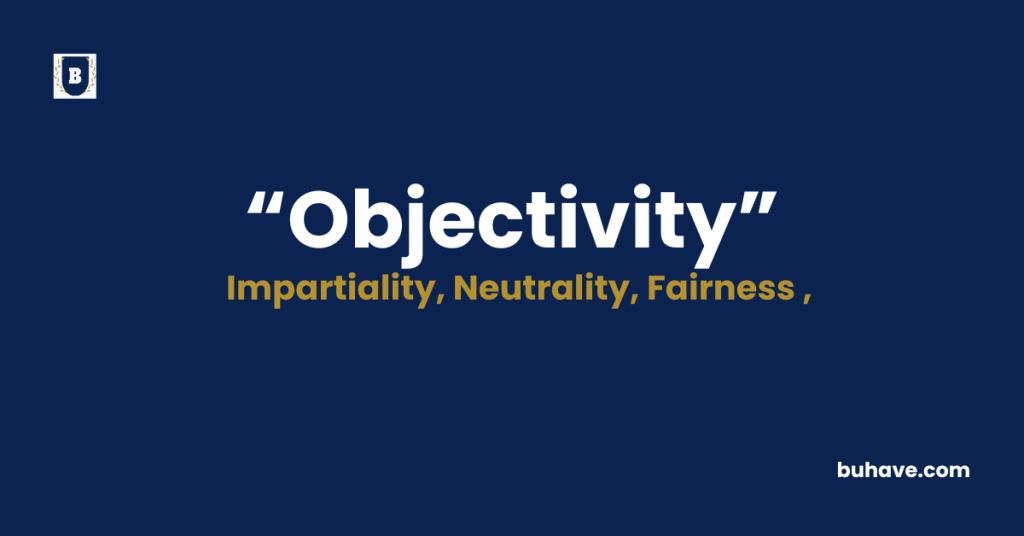The word Objectivity (Noun) refers to the quality of being impartial, fair, and not influenced by personal feelings or biases. In this guide, you’ll learn the full definition, synonyms, antonyms, etymology, and real-life examples of how to use Objectivity correctly in sentences.
Objectivity Explained in Depth
A complete and detailed guide to the word Objectivity including meaning, definition, examples, etymology, synonyms, and antonyms.
Meanings of Objectivity
Objectivity means approaching situations, decisions, or judgments without personal bias, emotions, or prejudice. It involves seeing things as they truly are, based on facts and evidence, rather than opinions or assumptions. Objectivity is often essential in journalism, science, law, and ethical decision-making.
Definition
Objectivity refers to the practice or quality of maintaining a neutral, unbiased perspective when evaluating information, making decisions, or forming judgments. It emphasizes fairness, transparency, and accuracy by separating facts from feelings. An objective person relies on observable evidence and logic rather than personal beliefs or preferences. In professional settings such as journalism, research, medicine, or education—objectivity is vital to maintain credibility and fairness.
While complete objectivity may be difficult to achieve due to human nature, striving for it helps minimize errors, promote trust, and support balanced outcomes. In philosophical terms, objectivity contrasts with subjectivity, which focuses on personal interpretation or perspective. By using objectivity, individuals and institutions can ensure consistency, justice, and clarity in both analysis and communication.
Etymology
The word objectivity derives from the Latin root objectum, meaning “thing presented to the mind” and from ob- (toward) + jacere (to throw). The term “objective” was first used in English in the 17th century in philosophical contexts, referring to things existing outside the mind. By the 19th century, “objectivity” became more commonly associated with neutrality and fact-based reasoning, particularly in the sciences and journalism.
Its usage expanded over time to include all areas where fairness, accuracy, and impartial evaluation are valued. Today, objectivity is considered a core principle in ethical standards, academic integrity, and critical thinking, reflecting the pursuit of truth over bias or emotion.
Example Sentences
- Good scientists strive for objectivity when interpreting experimental results.
- The journalist was praised for reporting with clarity and objectivity.
- In court, judges must maintain objectivity to ensure justice is served.
Objectivity Synonyms
- Impartiality
- Neutrality
- Fairness
- Unbiasedness
- Dispassion
- Equity
- Even-handedness
- Open-mindedness
- Honesty
- Detachment
Objectivity Antonyms
- Bias
- Prejudice
- Subjectivity
- Partiality
- Favoritism
- Unfairness
- Discrimination
- Opinion
- Emotion
- Preference
FAQs about Objectivity
Here are some frequently asked questions (FAQs) about the word “Objectivity”
1. What does “objectivity” mean?
It means judging or evaluating things based on facts and evidence, without being influenced by personal feelings or bias.
2. Why is objectivity important?
Objectivity ensures fairness, builds trust, and supports clear, fact-based decisions in areas like science, journalism, and law.
3. Can people truly be objective?
While perfect objectivity is difficult, individuals can work toward it by being aware of their biases and focusing on evidence.
4. What’s the difference between objectivity and neutrality?
Objectivity involves evaluating based on facts, while neutrality means not taking sides—though the two often overlap in practice.
5. Is objectivity the opposite of subjectivity?
Yes, objectivity is based on external facts; subjectivity is based on personal opinions, feelings, or perspectives.

















